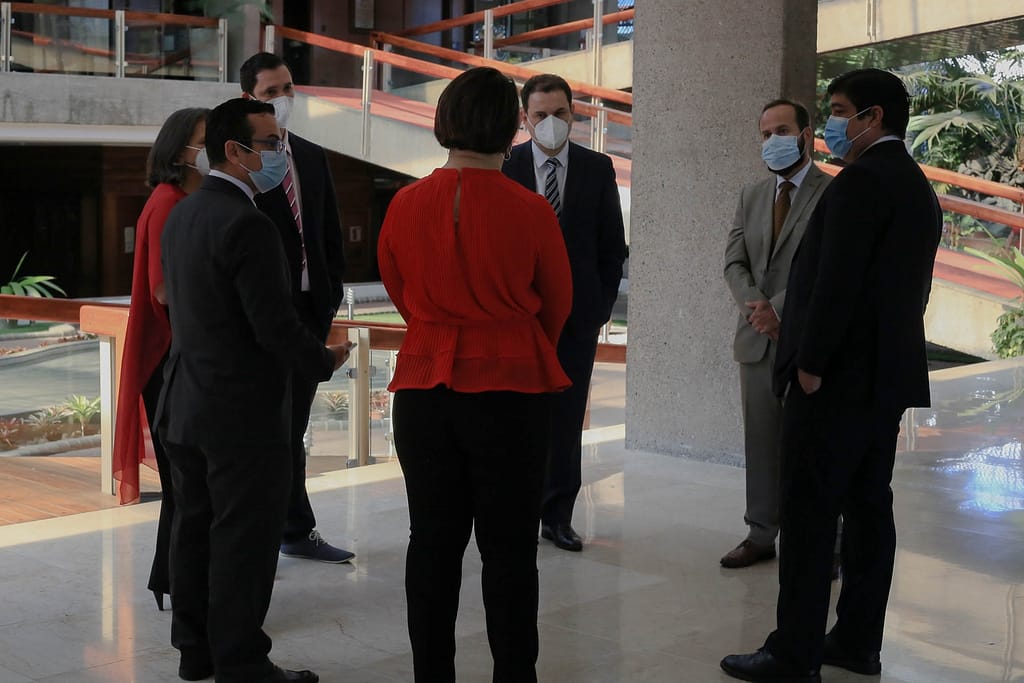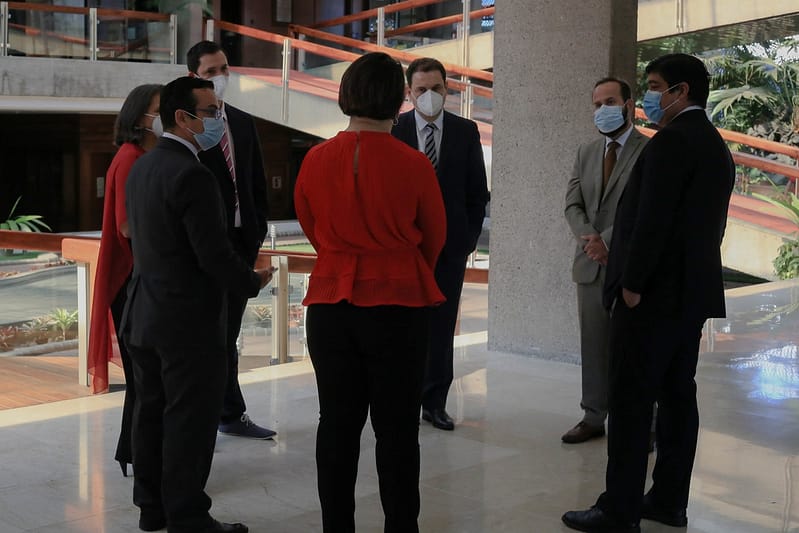- The regulations seek to position Costa Rica as a filming destination for large, medium and small film and audiovisual companies.
- With a series of incentives, the law will generate investment, productive linkages and the hiring of Costa Rican human talent for the execution of works.
- This instrument strengthens the competitive fund for financing national audiovisual and film projects, El Fauno.
The President of the Republic, Carlos Alvarado Quesada, signed this Tuesday, November 16, the “Law for the Attraction of Film Investments in Costa Rica” (N.10071), approved in second debate by the Legislative Assembly -unanimously-, by 40 deputies, on October 12, 2021.
The activity took place at the Presidential House with the participation of President Alvarado, the Minister of Culture and Youth, Sylvie Durán, and the Minister of Tourism, Gustavo Segura -signers of the law together with the Ministers of Finance, Foreign Trade and Economy, and Industry and Commerce.
Also in attendance were congressman Carlos Ricardo Benavides and legislator Laura Guido, proponents of this initiative, the general director of the Centro de Cine, Raciel del Toro Hernández, and José Castro, Costa Rica’s film commissioner.

President Alvarado highlighted the importance of this law, whose objective is to position the country as a filming destination for large, medium and small film and audiovisual companies, which generate investment, productive linkages and hiring of personnel for the production of works.
The President mentioned among the benefits of the new regulations, the increase in foreign capital investment, the generation of employment and economic reactivation, as well as the range of opportunities that will open up for the development of Costa Rican talent in the entire range of audiovisual production.
Among the film activities considered for the benefits granted by the law are short, medium and feature films; documentaries, series and novels; audiovisual marketing pieces, commercials and video clips, as well as post-production services, drawing, digital animation, and video games, among others.
Minister Durán agreed that the approval of the law “translates into economic dynamism, both for the sector and Costa Rican professionals linked to filmmaking, as well as for those who are involved in the activity from many different angles: the person who prepares lunches for the production team, those who assist, apply makeup and design, the driver who collaborates in the logistics and transportation of equipment and personnel, hotel occupancy, technological or post-production services.
“In short, it is a law that opens a wide window of possibilities to boost the economy around the audiovisual activity in the country,” he stressed.
For the general director of the Film Center, “the signing of the Law to Attract Film Investment in Costa Rica is a historic achievement, not only for what it represents in terms of attracting foreign capital, job creation and economic reactivation, but also because it means the tangible recognition of an increasingly thriving sector, and will contribute to enhance the vast national talent and strengthen the financing mechanisms of our own content.
Incentives. One of the most important incentives of the law is that it will allow foreign productions and co-productions of national and international capital, with an investment in Costa Rica of over $500,000, to be reimbursed 90% of the Value Added Tax (VAT). The remaining 10% will be directed to the Fund for Audiovisual and Cinematographic Promotion “El Fauno”, in charge of the Costa Rican Center for Cinematographic Production, an institution of the Ministry of Culture and Youth, to promote national talent.
Other benefits to be granted by the law are: exemption from income tax for those actors, producers and foreign personnel who receive their payments abroad; temporary importation of equipment and spare parts for film and audiovisual production into the territory with suspension of all import taxes, as well as exemption from guarantee deposit; exemption from all import taxes, levies, duties or contributions on tools, costumes, makeup, scenery and technical material required for the realization of the project; and persons in charge of bringing in materials, equipment or costumes for the project will be provided with the entry of the corresponding luggage, without payment of taxes or other charges.
Referring to the importance of this legislation, José Castro, Costa Rica’s film commissioner, commented that since the establishment of the Film Commission in the Foreign Trade Promotion Agency (PROCOMER), “we have been working to attract audiovisual investment and even with important promotional arguments such as our locations, we have lost up to $114 million in audiovisual projects in a period of 24 months, projects that opted for countries that offered financial incentives.
He added that “today, we are developing Audiovisual Friendly Zones in rural territories, where international projects and national productions will be able to make the most of the benefits of this law”.
Source GOBIERNO DE COSTA RICA







